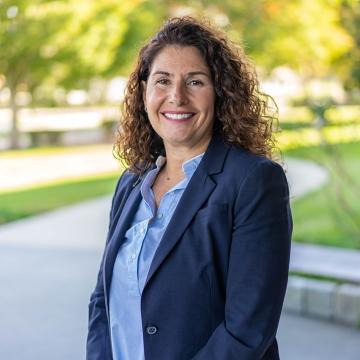Deborah Gonzalez

Education
B.S., Roger Williams University
J.D., Roger Williams University
Deborah Gonzalez is the Director of the Immigration Clinic. Student Attorneys in the Immigration Clinic are licensed to practice law under Deborah’s license pursuant Article II, Rule 9 Supreme Court Rules. Student Attorneys represent indigent immigrants who need assistance in defending against removal proceedings or obtaining lawful permanent residence through some form of relief before the U.S. Citizenship & Immigration Service. Student Attorneys learn substantive immigration law in the Immigration Clinic, as well as lawyering skills such as interviewing, counselling and litigation practice in the Immigration context.
Prior to becoming the Director of the Immigration Clinic, Deborah was a partner at Gonzalez Law Offices, Inc., since 2008. Deborah’s practice included defending immigrant clients in the Immigration Court in Boston, MA, against removal by seeking relief in the form of cancellation of removal, adjustment of status, waivers, asylum, and/or termination of removal. Deborah’s practice also included representing immigrant clients before the U.S. Citizenship & Immigration Service in an affirmative setting, where she sought relief for her clients by way of adjustment of status through VAWA, SIJ or family based petitions, as well as asylum and naturalization. Moreover, Deborah’s practice included employment immigration law, where she represented various foreign nationals employed at the University of Rhode Island, Brown University, Gordon School, Alex and Ani and Lifespan, and others. While in private practice, Deborah also practiced family law and criminal law.
After graduating from law school, Deborah began working with local immigrant community and became an active member of the Pro Bono Collaborative. In March of 2015, Deborah and a group of three law students, through the Alternative Spring Break program, volunteered to work at the Karnes Detention Facility in San Antonio, Texas, helping mothers and children detained by Immigration Customs Enforcement to fight for bond, and filing asylum applications before the Immigration Court in San Antonio, Texas. Deborah and the students also helped the mothers with their appeals from denials of bond.
In 2015, Deborah won the Roger Williams University School of Law, Alumni Public Interest Champion Award for her service with the immigrant community. She has also received the Super Lawyers Rising Star for 2012, 2013, 2014 and 2015.
She presently serves as the Secretary for the Board of Directors of the Rhode Island Latino Dollars for Scholars, having been on the board since January of 2014. She has served as Sub-Committee Chair of Welcoming Rhode Island, Dorcas International Institute (formerly International Institute) since 2010. Deborah serves on the Public Service Committee of the Rhode Island Bar Association since 2013.
She is a member of the Federal and Rhode Island Bars, Women’s Bar Association, Rhode Island Association for Justice, Rhode Island Criminal Defense Lawyers Association, Rhode Island Hispanic Bar Association, American Immigration Lawyers Association, and American Bar Association.
Articles
Sky Is the Limit: Protecting Unaccompanied Minors by Not Subjecting Them To Numerical Limitations, 49 St. Mary's Law Journal 555 (2018)
Immigration Consequences to a Charge of Simple Assault or Battery, Rhode Island Bar Journal, January/February, 2013, at 21

